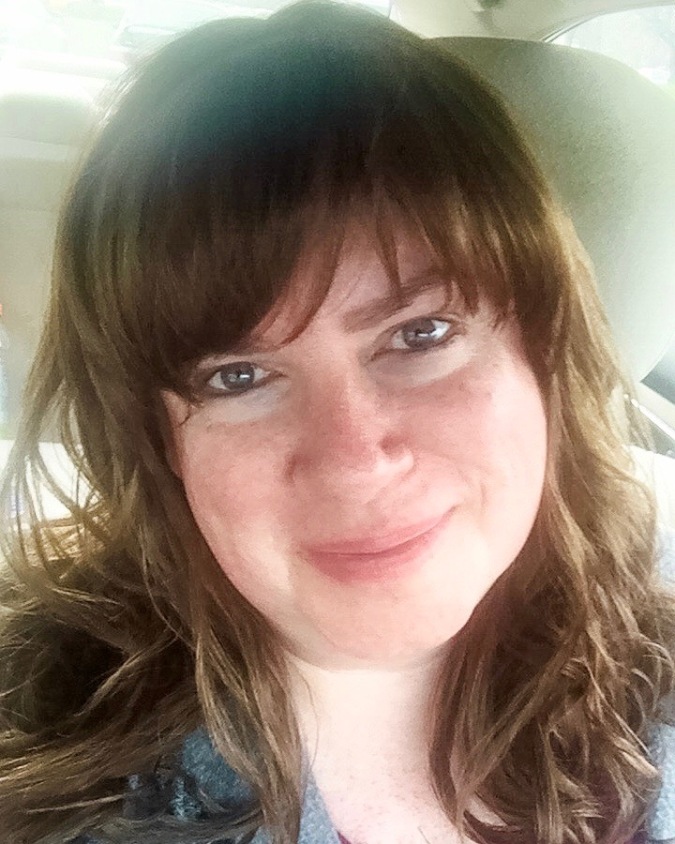
Today I am 52 years — and one day — old.
But I’ve achieved this milestone despite a choice I made in 2014. And because I lived to make another one.
I stepped into traffic on the New Jersey Turnpike. And I did it because I could not bear the burden of being unloved, unworthy and distrusted by the woman I still loved. I was devastated by a few words she said, words she refused to take back, that cut through me like a knife:
“I’d be better off if you were dead.”
 I held the cellphone to my ear as I begged her to recant, as I stood in the fast lane with my back to oncoming traffic. It was not the busiest day ever, but there were still cars, tractor trailers and buses that swerved to avoid striking me. Some blared their horns, but I didn’t budge. I didn’t consider how my suicide might take someone else’s life; I didn’t consider how my wife and kids would feel about me killing myself. I didn’t care. I didn’t care about anyone else. And at one point, I hung up the phone, when I realized I didn’t care if Wendy loved me or not.
I held the cellphone to my ear as I begged her to recant, as I stood in the fast lane with my back to oncoming traffic. It was not the busiest day ever, but there were still cars, tractor trailers and buses that swerved to avoid striking me. Some blared their horns, but I didn’t budge. I didn’t consider how my suicide might take someone else’s life; I didn’t consider how my wife and kids would feel about me killing myself. I didn’t care. I didn’t care about anyone else. And at one point, I hung up the phone, when I realized I didn’t care if Wendy loved me or not.
Because I didn’t love me, either.
I snapped one last picture, and no, it wasn’t a selfie. And it slowly dawned on me, that this was a mistake. I actually laughed at myself, standing in the middle of a highway and unable to end my life without someone else delivering the fatal blow.
“Can’t even succeed at killing myself,” I muttered. “I am a total failure.”
That was the exact opposite of how I felt just a day or two before. I had been well-received by longtime friends, at a reunion in sunny Florida. I had also met my mother as my authentic self, and made every effort to reconcile our differences. I hugged her goodbye, never to see or speak to her again. I left Florida feeling hopeful for the future, and at peace.
On the way home to Connecticut, I had stopped for lunch in my old Jacksonville neighborhood when I received word from my job: I was getting fired, and a young colleague who I had trained had been promoted — to management. Isn’t that a coincidence, I thought.
Just the month before, I had resumed my transition, and my employer had built a bullshit case of “performance issues” based on what this one person reported, in order to curry favor and advance their own career; the kind of transgressions overlooked in a favorite employee and used to blackball someone whose file included the worrisome notation, “business unit growing concerned about headlines” that my transition had generated in the tabloids. Almost all of that coverage was negative.
I was summoned to appear before a meeting of my boss, the head of human resources, and the VP in charge of HR and legal affairs. She was the woman who shepherded me through my transition and all the troubles that followed. My only hope of avoiding — more likely, postponing — my fate, was to take a medical leave of absence.
In a panic, I phoned my therapist and asked for a letter citing just such a need. I told her I was desperate. And to my surprise, my therapist said, “no.”
“I’m thinking you want me to give you this just to avoid being fired,” she said.
Well, duh. I mean, what was happening was clearly unfair. And I wasn’t just looking to avert the inevitable. I was rightfully frightened about my future.
It was the start of summer, when Wendy stopped getting paychecks from her job as a school teacher. My wife and kids were dependent on me until late September. How would I support my family? And I had just moved into my own apartment, my first in my true name, at considerable expense. How would I support myself?
“I’m at the end of my rope,” I told my therapist. “I can’t live if this happens.” She cast aside my pleas and my feelings of desperation, and told me I should go to an emergency room or call 911 if I “really” wanted help. Really? At that exact moment, I fired her, although it felt like she had already fired me.
And so I prepared to face the network firing squad.
It didn’t help boost my spirits that my wife blamed my situation on my transition, as if this path of self-destruction was the only possible outcome, and she let me know she still felt I was worth more to her dead than alive. I felt utterly and completely without value.
We had dinner as a family one last time. She then dropped me off at Union Station in Hartford for the train to New York.
It was raining, which covered up the tears streaming down my cheeks. I stepped up to the platform and dialed the number of a close friend and confidante who I had dubbed my Trans Jiminy Cricket for helping me throughout my tumultuous transition.
Getting no answer, I left a cryptic voicemail, saying goodbye, and stepped in front of the oncoming Amtrak train in an attempt to kill myself, once and forever.
I looked into the eyes of the motorman. The raindrops pelted my face. I closed my eyes and listened to the blaring train horn. It blotted out almost every sound, except one: that of my iPhone ringtone.
The shrill classic phone ring penetrated my contemplation of imminent death, the end to all suffering, and like a child tugging on the hem of my skirt, demanded I heed its call, to life.
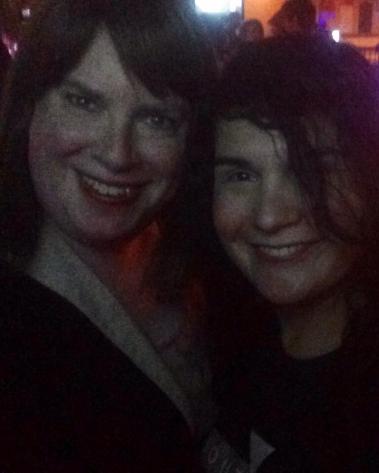 It was Maia, my Trans Jiminy Cricket, calling her Trans Pinnochio.
It was Maia, my Trans Jiminy Cricket, calling her Trans Pinnochio.
“What are you doing?” she asked.
“I’m standing on the tracks, waiting for the train to kill me. It’s coming.”
She didn’t mince words. “Get out of there,” Maia said.
She didn’t raise her sweet, sultry voice or beg or plead. She just told me matter of factly what to do, and waited on the line until I told her I did.
“Good. Now get on the train and I’ll call you right back in a few minutes. Okay?”
“Okay,” I said. Her calm demeanor made me feel calm; her unemotional but strong way of speaking settled me down.
Maia, like many of us, once considered ending it all. She lost her marriage and left their only child with her ex-wife, so she should live authentically. Maia told me God once spoke to her, and to her that was affirmation enough that this was the life she was meant to lead.
I was still waiting to hear from God, but in a few minutes time, I received a message from author and mentor Jenny Boylan on the train to New Haven. She had heard what I had attempted from Maia.
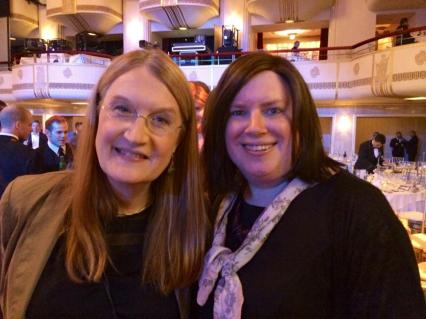 “Don’t do something stupid,” wrote Jenny, in that professorial parental tone millions of people have seen her use on the world’s most famous (and perhaps most politically stubborn) woman, Caitlyn Jenner.
“Don’t do something stupid,” wrote Jenny, in that professorial parental tone millions of people have seen her use on the world’s most famous (and perhaps most politically stubborn) woman, Caitlyn Jenner.
She urged me to call the National Suicide Prevention Hotline. And so I did. I told the young woman on the other end of the line my story and what was driving me to end my life, and how I was basing my own value on how my wife perceived me.
“Well, you really can’t blame her,” said the woman who was trying to convince me my life was worth living. “She’s been through a lot and she’s being honest with you about her feelings.”
“Yes,” I said, “but I’d like to talk to you about my feelings, okay? Not hers.”
“I understand — Click!”
“Hello?!”
Yes, the Suicide Hotline hung up on me. No, not on purpose; a few minutes later my phone rang and I let it go to voicemail. When I checked it later I heard the young woman apologize for inadvertently hanging up on me.
“Please do call back, if you’re, um, still there.”
I was still there even though I decided to not call back. 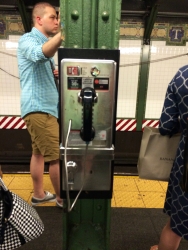 But I did dial 911, when I got to Times Square, because I found myself unable to leave the subway platform.
But I did dial 911, when I got to Times Square, because I found myself unable to leave the subway platform.
 Train after train came and left. I watched as men and women of all ages and races and faces and places boarded and disembarked the number 1 local uptown and to The Bronx.
Train after train came and left. I watched as men and women of all ages and races and faces and places boarded and disembarked the number 1 local uptown and to The Bronx.
But all I could think was that train would take me to my apartment to spend the night awaiting my doom, and take me back here to Manhattan where my career would be pulverized into dust, my name disgraced and my professional life ended. If I left this platform that step would set in motion the events that would end my role as provider for my family.
I was, to put it mildly, distraught. My call brought the police, and the paramedics, who took me from the subway station… to Bellevue.
The official police terminology for my case is EDP: “emotionally disturbed person.” All those years hearing “EDP” on the police scanners in the newsroom, and in my dad’s home office, and now, I was the EDP.
It was the right call, even if Bellevue was the worst possible place to go. I wasn’t crazy, or insane. I was distraught and needed to get my head straight. But Bellevue? Imagine a holding place chock full of depressed, suicidal and unhinged men and women, stripped of their belongings and with no ability to reach the outside world, or even see it. No windows, no media, no phones, no nothing except beds, chairs and some very disturbed people.
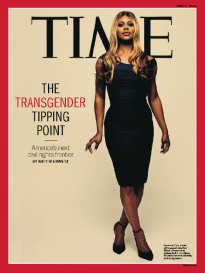
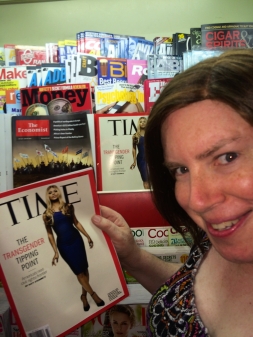
#TransIsBeautiful
The only thing they let me keep was a certain copy of Time magazine, with Laverne Cox on the cover. This was my own personal Transgender Tipping Point.
I wasn’t medicated or treated, just allowed to sleep (with the lights on) and to contemplate what had led me here and what might await me when… if… I were released.
After brief interviews with a psychologist and a psychiatrist and some calls to my doctors, wife and therapist, I was determined to be no danger to myself or others, and let go.
And I had been let go from my job, too, without a hearing. It had been a day: I missed the big meeting, I didn’t produce a letter requesting medical leave, and so I was terminated.
I responded to the official email with a proposal that we not bash each other in the media, and they agreed. And after they bashed me in the media — the Daily News quoted “an insider” — we entered into negotiations which, let’s just say, ended to my satisfaction.
All this taught me survival skills, and lessons you can put to use: first among them is that nothing is more important than my children. Had I gone through with suicide, my kids would be orphans now. As one of the 41 percent of trans people and gender non-conforming adults who consider or attempt suicide, I am aware many people are not as lucky as I am to have lived, or to have access to their children.
Second: it’s important is to not let others’ perceptions define who you are. I needed to learn to respect Wendy’s perspective and to determine my own. After a time, she did recant, and agreed the words — although they were just words — were not true. I regained her trust; Wendy came to see me as the woman I am, and even said she loved me, as the father of her children and her co-parent. Time healed the bitter wounds that had broken her heart.
Third was to reach out for help. Thanks to Chloe Schwenke, the late Rick Regan, Maia and Jenny, Susan and even Wendy, I survived these attempts, and got help to get past my acute depression. It took time. It got worse. But ultimately it did get better. And mental health counseling was part of that solution. It’s not something we should stigmatize, it’s something we as a society ought to look at as part of being healthy. I am grateful to those who helped me be the healthy person I am today.
And last was to not take myself so seriously. I found other jobs. We survived the summer from hell. I laughed at my own inability to end my life, and thanked God for such incompetence.
And despite the turmoil and media trashing, thanks to the hard work of attorney Jillian Weiss, I left on good terms with my former employer, and I’d recommend working for them if you’re given the opportunity. Better days hopefully lay ahead.
I wrote this not just in reflection of my birthday, or the fact that Easter is upon us with its message of renewal and resurrection from death, but with the recent suicide of a friend’s transgender son in mind. It is hard to contemplate how anyone can take their life, unless you’ve been there, until life is so unbearable that even death, and the thought of causing pain unto others, doesn’t matter to you. I pray you never experience it. And if you do, that you find someone to help you see that holding on just one more day is worthwhile.
A friend once told me, you don’t need to win the fight. Just remember when you’re knocked down to get back up, one more time… and to do that every time you are knocked down. Because you will be, and the only way to finish the fight is to keep getting up.
I pray for those who couldn’t, and for those left wondering… why.
If you are a trans or gender-nonconforming person considering suicide, Trans Lifeline can be reached at 877-565-8860. LGBT youth (ages 24 and younger) can reach the Trevor Project Lifeline at 1-866-488-7386.The National Suicide Prevention Lifeline at 1-800-273-8255 can also be reached 24 hours a day by people of all ages and identities.
A trust has been established by Wendy’s brother, Robert Lachs, to assist with furthering the education of the Ennis children. Anyone wishing to donate to the fund may click here to donate via GoFundMe.








Oh, Dawn, you break my heart all over again. This is not your story. This is also mine, and it brings back memories of such pain. When I went for my evaluation, one of the psychiatrists (of course) asked for me to recount my “history.” When I got to the point where I talked about standing in front of the mirror, hating myself because I couldn’t take the pills, his comment was, “There must have been a lot of anger there.”
I told him I didn’t remember the anger. Just the pain. He went on (at some length) about how there was “always” anger underneath. Finally, I allowed as how, perhaps, he might have been right. After all, this was not an argument I could possibly win, and the stakes were just too high to even try. To this day, I am still astonished at the arrogance of the man, (Of course it was a man.) who could presume to know me better than I did myself, based on what would have been at that point, about a thirty minute interview.
But I wander from the point. Here is the point, and it is the same as yours. Somehow, I got through the pain. I don’t remember how. From time to time, the memory comes back, but it is just a memory. There is not a day goes by that I am not astonished at, and grateful for, the life I have now. And while the memory is painful, should I be reminded, it has come to be a kind of touchstone, a reminder of just how far I have come.
Ours is a long road, and a dark one, but in the end, for those fortunate enough to make the journey to its end, it leads to the light. I have to say, from my experience (and yours, too, I think) it’s worth the walk.
LikeLiked by 1 person
Dawn, with your permission, I’d love to feature this powerful post on T-Central. Beautifully written.
Calie
LikeLiked by 1 person
I’d be honored. Be my guest!
LikeLike
Thanks for sharing. A truly great post and glad to read that things are moving in the right direction.
LikeLike
Thank you, Lynn!
LikeLike
Pingback: “I Am A Leaf On The Wind…” | Life After Dawn